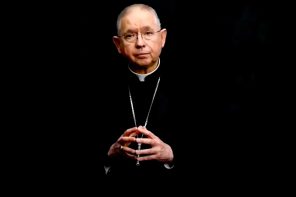“How does Proposition 8 protect marriage?”
U.S. 9th Circuit Appeals Court Judge N. Randy Smith asked the central question as he and two other judges heard from both sides on whether California’s ballot measure banning marriage equality for gays and lesbians should stand.
Charles Cooper, a lawyer who argued in favor of Prop. 8 using some difficult to follow circular logic, argued that California has a rational reason for distinguishing between same-sex and opposite sex couples, and therefore to deny marriage equality.
Cooper argued that if the word “marriage” is redefined, so is the institution. Marriage, of course, has been redefined many times over the millennia, and yet marriage, as a civil institution, persists, no matter what the changes.
The inclusion of same-sex couples simply can’t happen, Cooper argued, because marriage has always involved opposite genders—and exists for the regulation of procreation.
The key reason that marriage has existed at all in any society and at any time is that sexual relationships between men and women naturally produce children. Society has no particular interest in a platonic relationship between a man and a woman no matter how close, no matter how committed it may be, or emotional relationships between other people as well. But, when a relationship between a man and woman becomes a sexual one society immediately has a vital interest in that for two reasons – one, society needs the creation of new life for the next generation. But secondly, [society’s vital] interests are actually threatened by the possibility that unintentional and unwanted pregnancy will mean that the child is born out of wedlock and raised by, in all likelihood, its mother alone and that directly implicates society’s vital interests.
That argument didn’t fly with Judge Stephen Reinhart.
“That sounds like a good argument for prohibiting divorce,” he said, dryly. “But how does it relate to having two males or two females marry each other and have children as they have in California? I don’t understand how that argument says we ought to prohibit that?”
Cooper struggled to answer the question, basically rehashing the argument that marriage is for procreation, something Judge Vaughn Walker had already rejected in his original decision noting that, “The Supreme Court recognizes, that wholly apart from procreation, choice and privacy play a pivotal role in the marital relationship.”
An interfaith group of religious leaders who support Prop 8 issued a letter reinforcing Cooper’s argument.
“The broad consensus reflected in this letter—across great religious divides—is clear: The law of marriage is not about imposing the religion of anyone, but about protecting the common good of everyone,” said Archbishop Timothy Dolan of New York, newly elected president of the United States Conference of Catholic Bishops (USCCB) and one of the letter’s signers. “People of any faith or no faith at all can recognize that when the law defines marriage as between one man and one woman, it legally binds a mother and a father to each other and their children, reinforcing the foundational cell of human society.”
Brian Brown from the National Organization for Marriage expects to lose the case in the 9th Circuit however, claiming the three judge panel is stacked with liberals, including Clinton appointee Reinhart.
“It’s obvious that Reinhardt will vote to overturn Prop 8. We can only hope that once this case reaches the U.S. Supreme Court, that the people of California will finally get an impartial day in court. When they do, we are confident that marriage as the union of one man and one woman will be vindicated.”
The case is a long way from the Supreme Court right now. Before even ruling on the constitutionality question, the panel must first decide if those challenging Judge Walker’s ruling even have the standing to do so.
If the court does rule on the constitutionality issue, Ted Olson, attorney for the plaintiffs who filed suit against the passage of Prop 8, noted that the U.S. Supreme Court has never ruled that marriage is between one man and one woman. In every marriage case, he argued, the Court ruled that marriage is about liberty, privacy, the right to association, and identity.
What California has done with Prop 8, he argued, is “put a fence” around one group of citizens and denied them a basic right.
“California has taken a class of citizens and put them in a separate category; that is an act of discrimination and there is no doubt that it is discrimination and there is no doubt that it does great harm. Can it be justified under any standard of constitutional analysis? I argue it cannot be justified at the lowest standard of constitutional analysis,” he said.
In short, Olson argued, Prop 8 does nothing to protect marriage and only continues to discriminate against gay and lesbian citizens based on spurious, and largely religiously-based, arguments about “tradition.”




